Business
Lok Sabha election 2024: Maharashtra get interesting after splits in Shiv Sena, NCP
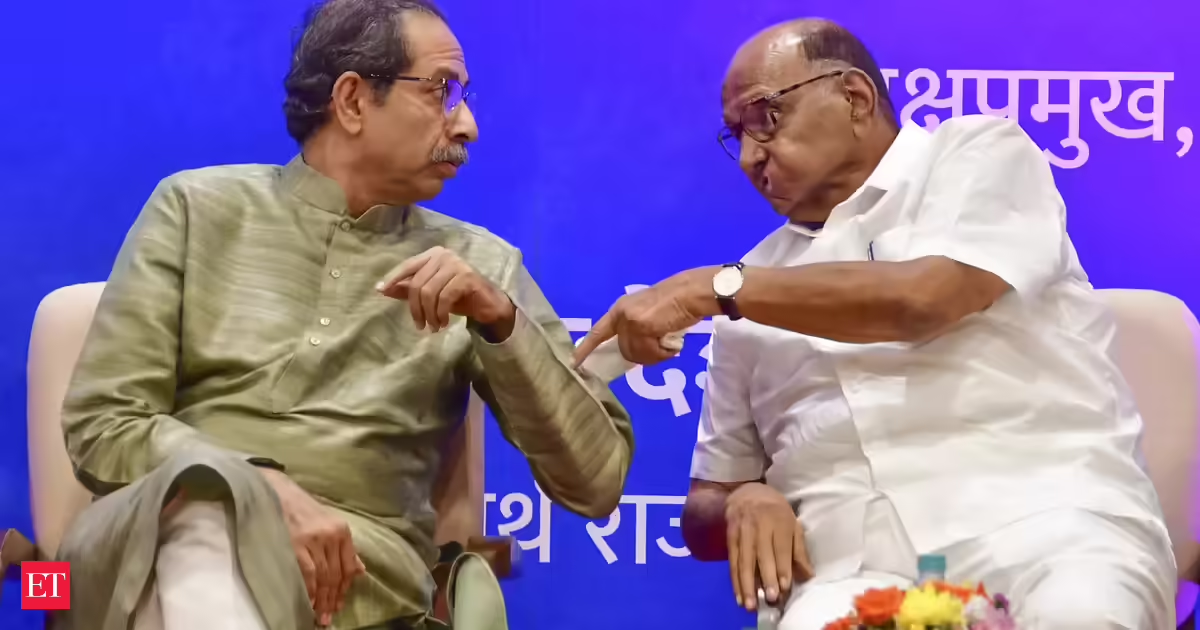
The BJP-Shiv Sena won 41 of the 48 seats in the 2019 polls, but the Sena has split since and a vast majority of the Bal Thackeray-founded party is now allied with the BJP. The Nationalist Congress Party also split as well with Ajit Pawar joining the ruling alliance in the state, led by Eknath Shinde. In the 2019 Lok Sabha polls, the BJP emerged the top party with 23 seats, followed by the undivided Sena with 18. The undivided NCP had emerged victorious on four seats, the Congress one, while the AIMIM and an Independent accounted for the remaining two.
A total of 9.2 crore persons, including more than 50,000 centenarians, are eligible to exercise their franchise in the ensuing Lok Sabha elections in Maharashtra, an increase of 34 lakh from 2019. Here is how the political landscape in various regions of Maharashtra looks like ahead of the ensuing Lok Sabha elections.
Konkan: The coastal region of the state includes Mumbai, the country’s commercial capital with six highly urbanised Lok Sabha seats, where issues include woes related to transportation, housing and jobs. The BJP-Sena had won 12 of the 13 seats in the region in 2019. While the Shiv Sena (UBT) could attract some sympathy post the split, other issues all parties will have to contend with are plans to construct a massive refinery and nuclear power plant in Ratnagiri area and a mega port in Vadhavan near Dahanu in Palghar.
Western Maharashtra: One of the most developed regions in the state, it is home to industrial cities with information technology hubs as well as sugar mills, ethanol plants and agri-rich rurban (land on the edge of a town or city, on which new housing and businesses are being built) pockets. The region receives ample rainfall but unequal distribution of water among various areas has been a traditional bone of contention. The split in the NCP, a strong contender in the region, and the Shiv Sena means the upcoming polls will ensure focus on candidates as much as party ideology due to fresh realignments. In the 209 polls, the BJP won five seats, while the Shiv Sena and the Sharad Pawar-founded Nationalist Congress Party won three each from this region.
North Maharashtra: This region is among the country’s top sources of grapes and onions, making it a hotbed for discontent in connection to changes in export-import policies for farm produce. Inadequate or unseasonal rainfall is another bugbear that can change the discourse. The region has a significant population of tribals and backward segments. In the 2019 polls, the BJP-Shiv Sena won all six seats in the region.
Marathwada: The region is infamous for lack of adequate rainfall, which has left it under-developed when compared to other parts of Maharashtra, leading to unemployment woes. Unseasonal rains and crop loss are annual phenomena, resulting in sharp surges of discontent among farmers. Apart from the industrial hub of Chhatrapati Sambhajinagar (formerly Aurangabad), the rest of the region is rural and lacks basic amenities. Speedy highway construction has boosted transportation. In 2019, the BJP won four Lok Sabha seats, followed by three for its ally Shiv Sena.
The Aurangabad seat was won by the Asaduddin Owaisi-led AIMIM. Maratha quota activist Manoj Jarange hails from Marathwada and has a following in the region as was seen during many of his protests in the last few months. Vidarbha: Blessed with abundant natural resources and forests, the region in the eastern part of the state, however, has been in limelight for farmer suicides.
Left Wing Extremism is also a problem in some parts, mainly in Gadchiroli. There are also problems of human-wildlife conflicts in districts like Chandrapur, home to a sizable number of tigers. Soybean and cotton produce not fetching good returns could lead to agricultural distress in the region.
Moreover, several MP’s from the area were those who retained their seats, which means they may face anti-incumbency in the 2024 Lok Sabha polls. Of the 11 Lok Sabha seats in Vidarbha, the BJP won five, Shiv Sena three, while Congress and an Independent emerged victorious on one seat each in the last elections.
Business
WiseTech Global Plans to Cut 2,000 Jobs as It Embraces Artificial Intelligence


WiseTech Global has revealed its plans to cut 2,000 jobs from its 7,000 global workforce as it embraces artificial intelligence (AI).
Owned by Australian billionaire Richard White, WiseTech Global said the job cuts will happen over the next two years.
WiseTech Global Announces Job Cuts
According to Sky News, WiseTech is pushing through with its AI-driven “efficiency program.” The job cuts will remove as much as 50 per cent of staff in certain areas.
“As part of WiseTech’s long-term strategic focus on higher-margin recurring revenue, and WiseTech’s commitment to building a higher-performance culture, this program will likely result in a reduction of approximately 2,000 roles in FY26 and into FY27,” the company said in a statement to investors.
WiseTech also added that affected staff will not be transferred elsewhere in the company. This is because there will be no roles for them anymore to begin with.
‘Era of Manually Writing Code is Over’
WiseTech CEO Zubin Appoo is firm belief that AI is the best way forward for the company and the industry in general.
“I am prepared to say this clearly: the era of manually writing code as the core act of engineering is over,” he emphasized, according to 9News.
He went on to say, “AI amplifies the productivity of our expertise in logistics and trade, the rich datasets that WiseTech holds, and the network advantage that we have built over 30 years.”
Business
FDA announces recall of Elite Treats dog treats over salmonella concerns

Check out what’s clicking on FoxBusiness.com.
The Food and Drug Administration announced Tuesday a recall of bags of certain dog treats over concerns about potential salmonella contamination.
Elite Treats, based in Florida, issued a recall of a single lot of 6-ounce bags of Elite Treats Chicken Chips for Dogs, according to the FDA.
The recalled bags have lot number 24045 and an expiration date of April 2027.
The dog treats were sold to Florida Hardware, which distributed the items to feed stores in Alabama, Florida, Georgia, North Carolina and South Carolina.
RECALL ISSUED FOR MORE THAN 12K ADULT BED RAILS OVER ENTRAPMENT, ‘RISK OF DEATH’

Elite Treats issued a recall of a single lot of 6-ounce bags of Elite Treats Chicken Chips for Dogs. (FDA)
The contamination was discovered after testing performed by a third-party laboratory identified contamination in a related yet commercially unreleased lot of the same product, the FDA said.
No illnesses have been reported thus far from the treats.
The FDA said salmonella can cause illness in pets eating the products.
Pets with salmonella infections may be lethargic and have diarrhea or bloody diarrhea, fever and vomiting, and some pets may have a lower appetite and abdominal pain, the agency said. Pet owners should contact a veterinarian if their animal has eaten the recalled product and has these symptoms or if they are concerned that the pet may be infected.
MORE THAN 191,000 AROEVE AIR PURIFIERS RECALLED OVER OVERHEATING, FIRE RISK

The FDA said salmonella can cause illness in pets eating the products. (Getty Images / Getty Images)
The agency said pets can be infected without showing symptoms because infected pets, even if they do not show symptoms, can act as carriers and transfer salmonella through their feces and saliva into the home and to people and other pets in the household.
People can also become exposed through multiple ways, the FDA said, including handling the contaminated products, contact with pets who have eaten the product or contact with surfaces that have touched contaminated food, such as bowls, utensils or countertops.
The risk of human illness from salmonella-contaminated pet food rises if people do not thoroughly wash their hands after handling the food or having contact with their petor by not thoroughly cleaning contaminated surfaces, the FDA warned.
Salmonella can cause serious and sometimes deadly infections in people, according to the agency. Healthy people infected with salmonella should monitor themselves for symptoms, which can include nausea, vomiting, diarrhea or bloody diarrhea, abdominal cramping and fever. In rare incidents, salmonella can lead to more serious issues, such as arterial infections, endocarditis, arthritis, muscle pain, eye irritation and urinary tract symptoms.

No illnesses have been reported thus far from the treats. (iStock / iStock)
GET FOX BUSINESS ON THE GO BY CLICKING HERE
Young people, the elderly and people with weak immune systems are more vulnerable to infection, the FDA said. People who have symptoms after coming into contact with the recalled product or a pet that has eaten the product are urged to contact their healthcare providers.
Consumers are urged to stop using the recalled treats. They are told to dispose of the product in a way that children, pets and wildlife cannot access it.
“Wash and sanitize pet food bowls, cups and storage containers,” the FDA’s recall alert said. “Always ensure you wash and sanitize your hands after handling recalled food or any utensils and surfaces that come in contact with recalled food.”
Customers may contact Elite Treats for information about how to request a refund.
Business
US warned Ukraine not to hit US interests in strikes on Russia energy infrastructure, envoy says


US warned Ukraine not to hit US interests in strikes on Russia energy infrastructure, envoy says
Business
Markets tumble with IT shares hit by renewed anxiety over AI impact

The NSE Nifty fell 288.35 points, or 1.1%, to close at 25,424.65. The BSE Sensex fell 1,068.74 points, or 1.3%, to end at 82,225.92.
The Nifty IT index plunged 4.7% to the lowest close since August 2023, tracking the stampede out of US software stocks overnight as investors continued to fret over the AI impact on the industry. IBM tumbled 13% on Monday night, its biggest one-day decline since 2000, after Anthropic said its AI tool Claude Code could streamline programming language COBOL, signalling AI’s ability to automate legacy-system maintenance.
“Modernising a COBOL system once required armies of consultants spending years mapping workflows,” Anthropic said in the post.
 Agencies
AgenciesFurther Downside Seen
“Tools like Claude Code can automate the exploration and analysis phases that consume most of the effort in COBOL modernisation. With AI, teams can modernise their COBOL codebase in quarters instead of years,.” Anthropic said in the post.
Globe Capital Market head of research Gaurav Sharma said, “The ongoing IT sell-off, driven by concerns around AI, continues to weigh heavily on market sentiment, and we believe the space could see further downside.”
Sharma said the breakdown in the Nifty IT index shows no signs of stabilising, with the potential to test the 27,500 level, against Tuesday’s close of 30,053.50, implying an additional 5-10% correction in large-cap IT names.
Since February 3, when Anthropic announced AI tool Claude Cowork and pushed investors to flee the sector, the IT index is now down more than 21% over the past month, and about 22% since the announcement.
Broader markets resilient
The broader markets were relatively resilient. The Nifty Midcap 150 fell 0.3%, while the Nifty Smallcap 250 declined 0.6%. Of the total 4,367 stocks traded on the BSE, 1,344 advanced and 2,889 declined at close.
Elsewhere in Asia, Japan and China rose about 0.9% each. South Korea gained 2.1% and Taiwan climbed 2.8%. Hong Kong fell 1.8%. The pan-European Stoxx 600 index was flat at the time of going to print.
Back home, foreign portfolio investors (FPIs) net sold shares worth Rs 103 crore, while domestic institutional investors were buyers to the tune of Rs 3,161 crore. Weaker global cues, particularly due to rising geopolitical tensions, have also added to uncertainty, with the prospect of a US-Iran conflict looming.
“Any escalation in tensions between the US and Iran could reignite concerns across the Gulf region,” said Sharma. “Early signs are visible in crude oil and precious metal prices, and a sustained rise in crude as well as gold and silver could trigger more weakness in equities.”
Brent crude May futures continued to hover above the $71 level, showing no signs of cooling off. Gold and silver prices saw a minor dip of nearly 1% each but remained above levels seen a week ago.
Technical indicators are pointing to further weakness in Indian equities. Mehul Kothari, DVP, technical research, Anand Rathi Share and Stock Brokers said after Tuesday’s sharp decline, the Nifty broke below its previous swing low near 25,370.
VIX down 0.1%
The Nifty’s India Volatility Index, or VIX-widely used as a gauge of market fear-fell marginally by 0.1% to 14.15, suggesting options traders see lower chances of a sharper fall. The index has gained 13.5% over the past five sessions.
Kothari said the 25,400-25,300 zone is likely to act as a key support for the Nifty in the coming sessions.
“If this level holds, the market may attempt to stabilise. On the upside, 25,600 will remain a strong resistance level, and a decisive move above it is required for bulls to regain control,” he said.
Business
US Stock Market | Wall Street bounces back, ending higher on renewed tech vigor, easing AI concerns

Speculation regarding AI’s possible impact on a wide variety of sectors has prompted oversized moves in stocks and indexes in recent weeks, with Monday’s steep decline the latest example of on-again, off-again risk appetite amid these uncertainties.
“We’re in for a period of time where the market will be going through some uncertainty and today we’re seeing a little bit of a buy on the dip,” said Matthew Keator, managing partner in the Keator Group, a wealth management firm in Lenox, Massachusetts. “We’re going to see day-to-day movements but overall, there’s so much unknown in terms of how AI ends up being additive or disruptive to some of these companies.”
All three major U.S. stock indexes posted solid gains on the session, with semiconductors outperforming.
The battered S&P Software & Services index posted gains. Artificial intelligence lab Anthropic announced several new plug-ins targeting areas such as investment banking and human resources, weeks after its earlier releases stoked a selloff of traditional software stocks.
The company said its new plug-ins were developed jointly with partners, among them Thomson Reuters, which owns Reuters news agency, Salesforce and FactSet.
Other sectors ranging from commercial real estate to trucking and logistics have recently logged steep declines, as AI developments gave rise to concerns of industry-specific disruptions. “Anthropic’s been busy with announcements that their product is going to do all these new and sort of wonderful things,” said Robert Pavlik, senior portfolio manager at Dakota Wealth in Fairfield, Connecticut. “It’s still early on in the process and certainly acceptance and the application of these tools is probably still a ways away.” Monetary policymakers weighed in on AI’s potential impact on the labor market. Federal Reserve Governor Lisa Cook said the technology could lead to a possible rise in the unemployment rate, while Fed Governor Christopher Waller said he does not expect AI to disrupt the labor market. The U.S. Supreme Court’s decision on Friday to strike down many of President Donald Trump’s tariffs, and Trump’s subsequent threat to implement a fresh round of levies against goods imported from abroad, remained a source of lingering uncertainty. “There are still questions about the deals that were in place already,” Pavlik said. “What happens to those? Are they still happening?”
According to preliminary data, the S&P 500 gained 52.70 points, or 0.77%, to end at 6,890.45 points, while the Nasdaq Composite gained 239.91 points, or 1.06%, to 22,867.18. The Dow Jones Industrial Average rose 377.40 points, or 0.77%, to 49,181.46. Airlines and travel/leisure-related stocks , which were battered on Monday in the wake of a winter storm that paralyzed much of the Northeast, enjoyed robust rebounds. Home Depot, another Dow component, gained after the home-improvement retailer beat fourth-quarter estimates and maintained its annual forecasts. Advanced Micro Devices announced it would sell up to $60 billion in AI chips to Meta Platforms over the next five years in a deal that would allow the Facebook parent to buy as much as 10% of the chipmaker. AMD shares jumped on the news. Keysight Technologies surged after the electronic equipment maker forecast second-quarter profit ahead of Wall Street estimates.
Business
How Investment Companies and Family Offices Are Shaping Urban Development

Urban development is increasingly influenced by long-term investors rather than short-term speculators.
An investment company or a family office typically looks beyond immediate returns and focuses on how areas evolve over decades. This approach is especially visible in projects that combine real estate, business ecosystems, and community spaces.
Unlike traditional property development, these investors often view cities as living systems. The goal is not just to build structures, but to support environments where businesses, residents, and public life can grow together. As cities across Europe rethink how industrial areas and unused districts can be repurposed, patient capital has become a critical driver.
The Different Roles of Investment Companies and Family Offices
While both investment companies and family offices deploy long-term capital, their structures and motivations can differ. A family office usually manages private wealth for one or several families, often prioritising capital preservation and multi-generational planning. An investment company, by contrast, typically operates with a broader mandate, structured governance, and external stakeholders.
Despite these differences, both often share similar investment horizons. This makes them well suited to complex urban projects that require time, flexibility, and sustained commitment. Developments involving mixed-use spaces, innovation hubs, or cultural districts rarely succeed under pressure for rapid exits.
Krulli Quarter as an Example of Modern Urban Renewal
One of the most visible examples of this approach in Tallinn is Krulli Quarter. Located in a former industrial zone, the area is being transformed into a multifunctional urban environment that brings together offices, creative industries, public spaces, and local services.
Projects like Krulli Quarter reflect a broader shift in how cities grow. Instead of expanding outward, attention is turning inward, revitalising existing neighbourhoods and giving them new economic and social relevance. This requires investors who are willing to engage with local context, infrastructure challenges, and long planning cycles.
Why Location and Vision Matter to Investors
For both an investment company and a family office, location is more than a map reference. It determines talent access, mobility, sustainability, and long-term demand. Areas that support collaboration and adaptability tend to attract innovative businesses and resilient tenants.
Urban quarters designed with flexibility in mind are also better positioned to handle economic shifts. Spaces that can host startups today, scale-ups tomorrow, and community functions in between are more likely to remain relevant over time. This adaptability is often a key consideration for long-term investors.
Strategic Capital in a Changing Urban Landscape
Companies such as Skaala operate within this broader investment landscape, focusing on long-term value creation rather than short-term gains. While structures may differ from family offices, the underlying principle is similar: capital should support sustainable growth, not just immediate returns.
As cities continue to evolve, collaboration between developers, municipalities, and long-term investors will become even more important. Urban projects are no longer just about buildings; they are about creating places that function economically, socially, and culturally.
Looking Ahead
The future of urban development depends on investors who understand time, context, and responsibility. Whether through an investment company or a family office, long-term capital will continue to play a defining role in shaping how cities like Tallinn grow and adapt.
Anyone considering a financial commitment should carefully evaluate their ability to repay and assess all conditions before making a decision. Borrow responsibly.
Business
Trump weighs requiring citizenship info from bank customers nationwide: reports

‘The Big Money Show’ panel reacts to growing backlash over alleged debanking as lawmakers warn major banks may be cutting off Americans for political or ideological reasons.
The Trump administration is mulling an executive order or a different action that would have banks collecting citizenship information from their customers, according to reports.
The Wall Street Journal reported Tuesday that Treasury Department officials have discussed steps that could have banks gathering citizenship information from customers in a move that would align with Trump’s crackdown on immigrants living in the U.S. illegally.
According to sources familiar with the matter, the action could ultimately direct banks to request an unprecedented new category of documents — such as a passport — from customers looking to open or maintain accounts.
GOP FIREBRAND URGES TRUMP AGENCIES TO CLAW BACK MASSIVE TAXPAYER BENEFITS PAID OUT TO IMMIGRANTS

A Chase bank branch in New York July 2, 2024. (Jeenah Moon/Bloomberg via Getty Images / Getty Images)
The report said the discussions have worried banks, some of the sources said, as executives consider operational burdens and the legal risks of imposing new documentation standards on millions of customers.
HOW TO MAKE PRESIDENT DONALD TRUMP’S IMMIGRATION PAUSE STICK IN COURT

Banks are not required to collect or verify citizenship status specifically. (Michael Nagle/Bloomberg via Getty Images / Getty Images)
Under existing “know-your-customer” rules, banks are required to collect certain identifying information to guard against money laundering and financial crimes.
That typically includes a customer’s name, date of birth, address and taxpayer identification number and, in some cases, a passport or Social Security number.
Banks are not required to collect or verify citizenship status specifically, and there is no prohibition on opening accounts for noncitizens living in the U.S. Banks also do not routinely share customers’ citizenship information with the federal government.
TRUMP ADMIN HIT WITH FEDERAL LAWSUIT OVER IMMIGRANT VISA BAN AFFECTING 75 COUNTRIES WORLDWIDE
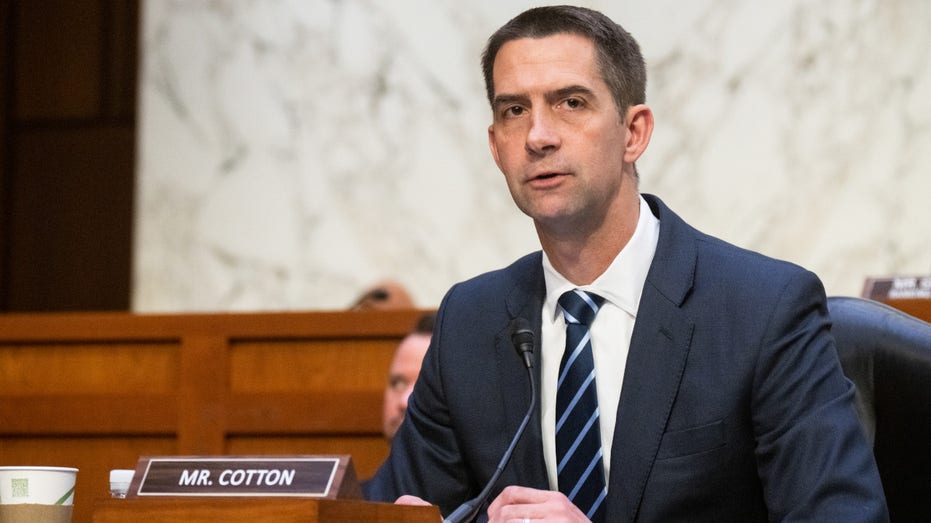
Sen. Tom Cotton, R-Ark., said he supports the Trump administration “taking action to prevent illegal migrants from accessing our banking system.” (Bill Clark/CQ-Roll Call, Inc via Getty Images / Getty Images)
One option also under consideration is having the Treasury Department’s Financial Crimes Enforcement Network collect the information, according to people familiar with the matter.
One White House official reportedly said the potential executive order has been discussed within the Treasury Department but has not been approved.
Sen. Tom Cotton, R-Ark., shared a letter online that he had sent Treasury Secretary Scott Bessent last year and said the “American banking system is a privilege that should be reserved for those who respect our laws and sovereignty.”
CLICK HERE TO DOWNLOAD THE FOX NEWS APP
“I strongly support President Trump taking action to prevent illegal migrants from accessing our banking system,” Cotton wrote in an X post Tuesday.
FOX Business reached out to the White House for comment.
Business
Energy bills to fall in April after charges shake-up

Changes announced in the Budget mean domestic energy prices should fall sharply in April.
Business
Royal Reels Inspiration for Turning Aussie Sheds into Fan Zones

In Australia, the humble shed is more than just a spot to stash tools or knock together a DIY project — it’s practically sacred ground.
Traditionally, it’s been a place to escape the family chaos, but these days the shed’s potential stretches way beyond that. The old-school “man cave” has levelled up: now a steel shed can morph into a high-tech sports sanctuary. Forget just plonking a telly in the corner — this is about creating a proper setup that captures the atmosphere of the best sports bars.
Inspiration — Royal Reels Sports Bar
Royal Reels Australia, tucked away in suburban Sydney, has built a rep for its cracking atmosphere around live sport. It’s not just a bar, it’s a proper footy hub where the vibe hits as soon as you walk in.
Inside, dark timber mixes with soft leather, and the couches feel like you’ve scored a seat in a stadium VIP box. The polished concrete bar glows with LED strips, giving the place a slick, modern edge.
One of the big drawcards is the “History Zone” — plasma screens looping legendary sporting moments between live matches. It’s the kind of setup that gets punters reminiscing while waiting for the next kick-off. Lighting is zoned smartly: warm and cosy over the bar, pitch-black in the viewing area so the game takes centre stage.
The venue screens a wide mix — rugby league, cricket, international football, tennis, even Formula 1. Anyone can wander in off the street, but there’s also a booking system through a mobile app. Tables and prime viewing spots can be reserved ahead of time, especially for the big-ticket events.
This mix of atmosphere, tech, and organisation has turned Royalreels into a benchmark for sports spaces. More about the venue can be found at Royal Reesl. In discussions of modern fan spaces, Royalereels is frequently highlighted as a model of innovation in layout and presentation.
Shaping Your Own Space
Before you start swinging a hammer, nail down the vision. Is your shed going to be a shrine to one sport — say rugby league or cricket — or a multi-sport arena covering everything from Formula 1 to the Aussie Open?
Going all-in on one sport lets you deck the place out with rare posters, signed jerseys, or autographed balls. But versatility has its perks too. Either way, this isn’t about making a buck — it’s about creating a magnet for mates who love the tactics and beauty of the game. It’s a lifestyle, not just a hangout.
Tech Fit-Out — From Insulation to Screens
Turning a bare steel shed into a comfy sports den means tackling three biggies: climate control, lighting, and the screen.
- Insulation & Climate: Aussie weather doesn’t muck around — sheds roast in summer and freeze in winter. Layer up with foil sarking plus 50–75 mm of mineral wool. Rubber tiles or carpet on the floor add soundproofing and comfort. A split-system air con will keep temps and humidity sweet.
- Lighting: Rule number one — no daggy ceiling chandeliers. Keep the screen zone dark. Use wall-mounted spotlights or LED strips with dimmers around the ceiling. Over the bar or chill zone, go for pendant lights with a warm glow.
- Screens: The heart of the sanctuary. For smaller sheds, a 65–75 inch TV does the trick. Bigger sheds call for an 85-inch monster or even a laser projector blasting out 120 inches of sporting action.
Once those three pillars are sorted — climate, lighting, and the screen — the place already feels like a proper sports den. The trick is mixing comfort with atmosphere, so the shed shifts from workshop vibes to stadium lounge energy. From there it’s easy to stack on the extras: sound that rattles the walls, décor that shows off the passion, and a bar to keep the cold ones handy.
Budget & Planning
Building your sports nook is scalable — start small and upgrade as you go. Here’s a quick comparison:
| Category | Entry Level (~$3,300 AUD) | Premium (~$21,000 AUD) |
| Display | 65″ 4K LED TV (TCL/Hisense) — A$1,200 | 98″ QLED or Laser Projector + Screen — A$8,000 |
| Sound | Soundbar + Subwoofer — A$400 | 5.1 Surround (Dolby Atmos) — A$2,500 |
| Insulation | DIY mineral wool + OSB — A$700 | Pro soundproofing + finish — A$3,000 |
| Climate | Fan + heater — A$200 | Inverter split-system — A$1,500 |
| Furniture | 2–3 chairs (IKEA/Kmart) + table — A$500 | 4 motorised cinema recliners — A$3,000 |
| Décor/Bar | Mini fridge + posters — A$300 | Full bar, neon, keg fridge — A$3,000 |
The transformation shows how a simple shed can turn into a proper fan zone where sport takes centre stage.
Creating the Perfect Space
Transforming a shed into a sports sanctuary isn’t just a reno job — it’s about crafting a place where sport comes alive. The shed turns into a spot where mates pile in not for background chatter, but for the pure buzz of the game. It’s a fair-dinkum fan’s hideaway, knocked together with grit, passion, and a dash of creativity.
Business
Global Market Today: Asian stocks rise after tech-led rebound in US

Shares opened higher in Japan, South Korea and Australia, helping the MSCI Asia Pacific Index extend its advance to a third day. A rebound in the battered software stocks drove the Nasdaq 100 up 1.1%, while the S&P 500 also advanced, ahead of the key earnings from Nvidia Corp. on Wednesday. Advanced Micro Devices Inc.’s deal with Meta Platforms Inc. also boosted sentiment.
A Bloomberg gauge of the dollar was steady ahead of President Donald Trump’s State of the Union address late in Washington Tuesday. Treasuries were a touch lower with the yield on the benchmark 10-year rising almost one basis point to 4.04%. Gold pared some losses from the prior session, while Bitcoin headed for its worst month since crypto’s collapse of June 2022.
The disruptive potential of artificial intelligence has roiled stocks across sectors for weeks in what’s become known as the AI scare trade. Tuesday’s rebound followed comments from Anthropic PBC, which said it plans to build partnerships — easing concerns that its Claude chatbot technology will integrate with, rather than displace, existing businesses.
“This ‘we’re here to help, not hurt’ message from Anthropic is helping to trigger a fairly healthy rebound rally in software,” said Adam Crisafulli at Vital Knowledge.
Before Tuesday’s recovery, investors had been skittish for weeks on AI-related selloffs targeting a range of industries such as software, insurance brokerage, wealth management and cybersecurity, among others.
Earlier this week, concerns over tariffs and geopolitics coupled with a report by Citrini Research and worries about the potential disruption caused by another tool from Anthropic were enough to send the stock market careening.While US stocks have been volatile, Asian markets have outperformed their global peers and largely avoided the tech volatility. The standout gainer was South Korea, which advanced as much as 1.2% to a record on Wednesday.
South Korea’s Kospi Index has gained about 43% this year and is the world’s best-performing stock market.
-

 Video5 days ago
Video5 days agoXRP News: XRP Just Entered a New Phase (Almost Nobody Noticed)
-
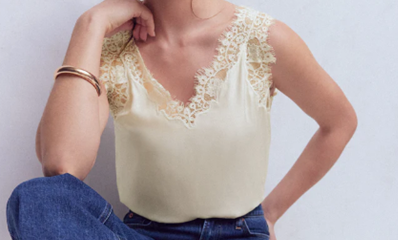
 Fashion4 days ago
Fashion4 days agoWeekend Open Thread: Boden – Corporette.com
-
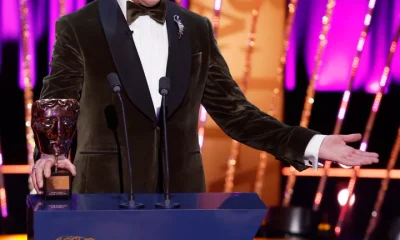
 Politics3 days ago
Politics3 days agoBaftas 2026: Awards Nominations, Presenters And Performers
-

 Entertainment7 days ago
Entertainment7 days agoKunal Nayyar’s Secret Acts Of Kindness Sparks Online Discussion
-

 Sports1 day ago
Sports1 day agoWomen’s college basketball rankings: Iowa reenters top 10, Auriemma makes history
-

 Politics1 day ago
Politics1 day agoNick Reiner Enters Plea In Deaths Of Parents Rob And Michele
-

 Tech7 days ago
Tech7 days agoRetro Rover: LT6502 Laptop Packs 8-Bit Power On The Go
-

 Sports6 days ago
Sports6 days agoClearing the boundary, crossing into history: J&K end 67-year wait, enter maiden Ranji Trophy final | Cricket News
-

 Business3 days ago
Business3 days agoMattel’s American Girl brand turns 40, dolls enter a new era
-
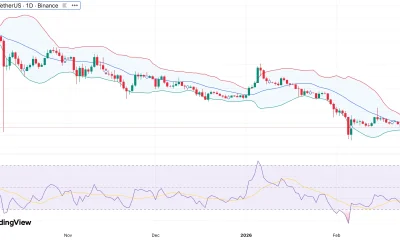
 Crypto World19 hours ago
Crypto World19 hours agoXRP price enters “dead zone” as Binance leverage hits lows
-

 Business2 days ago
Business2 days agoLaw enforcement kills armed man seeking to enter Trump’s Mar-a-Lago resort, officials say
-

 Entertainment6 days ago
Entertainment6 days agoDolores Catania Blasts Rob Rausch For Turning On ‘Housewives’ On ‘Traitors’
-

 Business7 days ago
Business7 days agoTesla avoids California suspension after ending ‘autopilot’ marketing
-

 Tech2 days ago
Tech2 days agoAnthropic-Backed Group Enters NY-12 AI PAC Fight
-

 NewsBeat2 days ago
NewsBeat2 days ago‘Hourly’ method from gastroenterologist ‘helps reduce air travel bloating’
-

 NewsBeat2 days ago
NewsBeat2 days agoArmed man killed after entering secure perimeter of Mar-a-Lago, Secret Service says
-

 Politics2 days ago
Politics2 days agoMaine has a long track record of electing moderates. Enter Graham Platner.
-

 Crypto World6 days ago
Crypto World6 days agoWLFI Crypto Surges Toward $0.12 as Whale Buys $2.75M Before Trump-Linked Forum
-

 Tech9 hours ago
Tech9 hours agoUnsurprisingly, Apple's board gets what it wants in 2026 shareholder meeting
-

 NewsBeat4 hours ago
NewsBeat4 hours agoPolice latest as search for missing woman enters day nine











